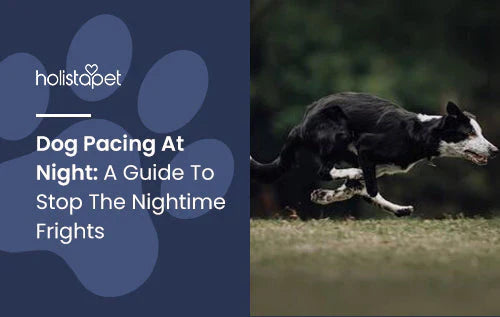Dogs are known as "man's best friend" for a reason. They are loyal, loving, playful, cuddly, and we can't get enough of their happy dances and tail wagging. But that doesn't mean we get annoyed when we are trying to sleep and hear our dog pacing at night and howling.
A dog pacing at night may just be restless. But sometimes, it can mean something more concerning like stress, senior dog skittishness, or an injury. Don't panic right away, but keep an eye on your dog's behavior. Here is what to look for if you notice your dog is restless at night.
Is It Normal for a Dog to Pace At Night?
Pacing at night can be normal for some dogs, depending on their personality, health, and age. Some dogs may just have a hard time settling down, same as us. Domesticated dogs have learned to adopt the same sleep-wake cycle as us. They often sleep at the same time and wake up at the same time.
But just like humans, some dogs are more energetic in the evening. If you just adopted your dog or they are a puppy, they might not be used to your schedule just yet. Maybe they just aren't comfy. Of course, there are some more serious reasons why dogs pace at night. So it's always good to figure out what exactly is causing your dog to perform this behavior.

What Does It Mean If My Dog is Pacing At Night?
There are many reasons why your dog is pacing, ranging from boredom to a possible illness. Here are the most common reasons that dogs pace at night:
- Restlessness: This is very common in puppies and younger dogs. They sleep during the day a lot more than adult dogs, so they can get a bit restless at night while they adjust to your routine.
- They need to potty: A dog that's getting used to your routine may run on a different potty schedule at first. You might hear your dog whimpering or scratching at the door.
- They're hungry: Similar to needing to potty, your new dog may be on an entirely different feeding schedule until they get used to your routine.
- Stress: A dog's unease can affect their sleep schedule, keeping them up and pacing while alone at night. A dog's nighttime frights could be caused by a move, a new pet in the house, or another big change. Stress can lead to repetitive behaviors.
- Cognitive dysfunction: Senior dogs often pace at night due to confusion. Cognitive dysfunction is a slow, progressive disorder similar to dementia. It causes your dog to sometimes reverse their sleep-wake cycle, leading to senior dog stress, pacing, and panting.
We recommend this product line for dogs that are restless:
[products ids='4977, 5689, 244747, 368952, 662406' columns='5' limit='5' class='my-shortcode']
Should I Be Concerned About My Dog Pacing At Night?
While pacing on its own isn't necessarily a reason to be concerned, keep an eye on your dog's behavior. If your dog is whimpering, limping, anxious, or afraid, there might be a concerning reason behind the pacing.
How Can I Help a Restless Dog Pacing at Night?
While waiting to hear your vet's opinion on your dog's pacing, there are things you can do to help your dog deal with its restlessness during the night. Here are some ways to address your dog's pacing.
Create a Schedule
Younger and older dogs alike thrive on schedules. Make sure your dog has a similar schedule each day. This will help your dog understand when it's time for bed. For example, walk them at the same time each morning, feed them simultaneously throughout the day, and play with them at the same time.
Make Sure They're Comforted
Your dog may have trouble sleeping if it can't relax. Sleeping on a hard, cold floor or itchy blanket can lead to pacing throughout the night due to restlessness and frustration. Give your dog a comfy dog bed (and place it in their crate if they feel safe there). Add their favorite toys and even throw in a shirt that you've just worn to further comfort your pup while you're not there.
Give Them CBD
If your dog's discomfort is the reason behind their pacing, try CBD dog treats — a non-psychoactive, natural compound found in the hemp plant. CBD supports your dog's endocannabinoid system (ECS), creating positive effects and improving their overall wellness.
CBD can help your dog feel comforted, soothed, and relaxed, relieving physical and mental issues alike. It will not only help your dog feel calmer but promote a good night's sleep. Give your dog CBD twice a day or every eight hours, including 30 minutes before bedtime. Consistent doses of CBD will make the effects more potent each time (even if you give them less over time).
You can try different types of CBD products depending on your dog's specific needs. HolistaPet has CBD oil for dogs, CBD treats, and CBD calming chews, as well as CBD dog shampoo. CBD oil is mixable in dog food in the morning and at night. CBD calming chews are a great choice for senior dogs since they are easier to chew and digest.
HolistaPet's CBD products are all vegan, organic, and natural. The CBD is safely and cleanly extracted from US-grown hemp, meaning it follows strict health guidelines. HolistaPet's CBD products are tasty and potent, making them a great choice for dogs with cognitive dysfunction or anxiousness at night.
Let Them Sleep With You
This isn't possible for every pet parent, but if you don't already share a bed with your canine companion, it could be a way to keep them comforted and relaxed. Dogs love being a part of every aspect of your life, even just cuddling in bed at night. Even placing a dog bed by your bed could reduce pacing.
Keep the Lights On
Senior dogs with cognitive dysfunction can become disoriented and distressed at night. Sometimes they end up sleeping in the morning and staying awake all night. Keeping the lights on may help them remain on your cycle. It can also reduce confusion if your dog feels lost or anxious.

When to Go to the Vet
If you notice your dog pacing repetitively all night, multiple nights in a row, you should contact a veterinarian just in case something happens behind the scenes. A veterinarian may be able to run tests that explain the reason behind your dog's behavior, helping you get the care they need and come up with a solution for your pacing pup.
Final Thoughts - Dog Pacing At Night
Puppies and newly adopted dogs will often stay awake at night when they aren't used to your sleep schedule. Sometimes pacing at night means that your dog is uncomfortable. Senior dogs will pace at night with cognitive dysfunction, causing disorientation and confusion. Dogs can also start pacing if their routine has changed and they feel nervous. They can also have trouble sleeping if they are sick or injured.
There are, luckily, some things you can do to keep your dog calm at night. You can reduce pacing by giving your dog CBD before bedtime, making sure they have a comfy spot to sleep, and keeping to a strict schedule they can get used to. Some dogs tend to adjust and sleep most the day. But if you notice consistent pacing each night, contact a veterinarian to see if there's something else going on with your pup. With the right help, your dog will finally get some much-needed rest.


 CBD Oil for Dogs - Fast Acting
CBD Oil for Dogs - Fast Acting
 Chicken Flavored CBD Oil For Dogs - Easy Dose
Chicken Flavored CBD Oil For Dogs - Easy Dose
 Salmon Flavored CBD Oil For Dogs - Highly Rated
Salmon Flavored CBD Oil For Dogs - Highly Rated
 CBG Oil for Dogs and Cats - Loved by Thousands
CBG Oil for Dogs and Cats - Loved by Thousands



![What To Give Dogs for Allergies [Remedies for Itchy, Sneezy Pups]](http://www.holistapet.com/cdn/shop/articles/287_66d78c2d-255a-49db-90c6-78dc4fbadad9.jpg?v=1743157739&width=500)

Leave a comment
All comments are moderated before being published.
This site is protected by hCaptcha and the hCaptcha Privacy Policy and Terms of Service apply.